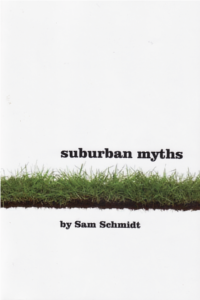Spring 2012
Table of Contents - Vol. VIII, No. 1
Poetry Fiction Translations Essays Reviews
Dan Cuddy
Sam Schmidt,
Suburban Myths, ISBN 978-1-105-56857-2, Beothuk Books, 2012, 78 pages, $18.00.
Sam Schmidt, a Baltimore poet, needs no introduction to literary people in Central Maryland, but he may require a bit of introduction to those beyond the area. It is not his fault. Fame can be elusive. Schmidt is one of a set of triplets born in Oregon; is a graduate of Princeton (Comparative Literature); has studied in Paris, at Johns Hopkins University in Baltimore; is the founder of WordHouse which was for a number of years before and after the turn-of-the century both a calendar of Baltimore Literary events and a showcase for local talent; he is a non-academic working man; a Federal government bureaucrat (though a good one); a loving husband and father of two young children. However, who Sam Schmidt is as a poet is found in this his first full book of published poetry. All the other biographical information is superfluous for discovering this entertaining, insightful poet.
Though Schmidt uses the images of fruit and knives often in his poetry, dominant motifs, and he was considering using the word “Fruit” in the title of his book, perhaps the title of one of the poems, “A Peach in the Dark” or “Apples and Pears”, friend and poet (well-known in certain Mid-Atlantic circles) Barbara DeCesare said with her forceful personality “absolutely not.” She thought such a title for the book would be deadly for promoting it. He and his publishers came up with Suburban Myths which is descriptive of the book as a whole and three of the poems are titled Suburban Myth and given a number. At a reading recently Schmidt said that he hasn’t written a long series of poems with that title and a number but just a few to indicate that there are many, many suburban myths still for him and others to write. Why Barbara DeCesare would be so adamant against “Fruit” in the title? Maybe it is because Billy Collins’ first book was called The Apple That Astonished Paris. Schmidt resembles Collins in many ways. Readers of Collins’ poems should enjoy Schmidt’s book. There is wit, learning, clear imagery and a sense of craft. Schmidt’s poems are grounded in everyday reality, though they often take off into their own imaginative world. His work, however, has often what Billy Collins poems only sporadically have and that is an underlying angst which gives Schmidt’s poems more than a surface or cultural experience. Collins, as good and readable as he is (damn good and readable), has become at times glib and mannered. Schmidt has that same tongue-in-cheek humor but his poems are as much from the heart as the mind. His poetry radiates sincerity, though a sincerity that is whipped into shape by a very inventive imagination, for instance the G.I. Joe series. If Sam Schmidt is a confessional poet, and there is a question about that, his confessions, all that earnestness, that dredging up of angst from his own past, are the stuff of myth, i.e. poetry. The title chosen is right on the mark. The drama takes place in that most unpoetic American place, the suburbs.
Schmidt is married to another accomplished Maryland poet, Virginia Crawford. She appears, though unnamed, in many of the poems. The first poem in the book is titled “How They Met.” It is so illustrative of the interaction and viewpoints of a married couple. She remembers the meeting one way and tells her story; he remembers it differently but acquiesces.
How out of that stranger
She began to emerge,
A known and shining face
Out of formlessness,
The woman who now stands
Beside him, calmly recounting
A fairy tale, him nodding and saying,
Yes, it was just like that.
There are three sections of the book. The first section is devoted to a man living with his family in the suburbs. Sam Schmidt has said, since he really doesn’t understand what living in the suburbs is all about, he lets his imagination run wild to give what many of us experience daily a mythic meaning. The poem “Suburban Myth #87” is a fantastic symbolizing of a cultural situation in which a man assumes the place of his car engine and makes the vehicle go. His wife is the driver. To make it even more interesting this narrative poem is written as four sonnets. Here is a short excerpt:
The key, but pistons start popping
In his brain. He’s guzzling gas, which burns
His throat but jolts him into focusing
On just one thing: Go fast! Go fast!........”
Is this not an apt symbol of American suburban life in these times? Schmidt has the talent of creating the right symbol to express our daily experiences. Another poem “The Two Cats” is wonderfully expressive in its use of cats as symbols. There is a literal reality to the poem, but Schmidt creates and uncovers so much more. One of the most endearing poems is “Pregnant Wife.” It is tempting to quote the whole poem but I will leave that for future readers to discover. These two stanzas can stand alone:
In and out of spray, I sometimes
Grab her suddenly: It’s love
But also fear of falling.
Our child, in her amniotic
Cottage, must hear fresh rain
Breaking over her roof.
Sam Schmidt has said that his book reads like a story in reverse of the actual events and emotions in his life. Today he is as happy as any married man with a family in suburban America. Life has been good. However, it wasn’t always so. Section Three is very, very dark at times. The key poem is “A Peach in the Dark.” The first stanza is dark indeed:
Apples, can please me, and poetry
Is a friend who has moved away,
I come home tired. The TV
Fills my brain, a cube
Of color and noise. I’m falling
In a cold night thick with stars.
The poem goes on and expresses the nadir of a broken hearted depressed man. Billy Collins hasn’t ventured into this territory. How does this poem end? After a confrontation with knives, the other great symbol in this book and often as not they are benign, frightening but a gift, the symbol of self-criticism which can be positive as well injurious, the poet opens the refrigerator and finds peaches.
Square and greenly toward the stem.
Against my fingers, a seam
Runs down the center; plush skin.
I’m holding one of the peaches
And standing there.
What is happening? A life, a poem are happening, and with an understated intensity.
Section Two is most like the quipster in Billy Collins. Schmidt’s subject is G.I. Joe, the toy----and also a symbol. The section is a mini-epic. In the 1990’s women poets were writing Barbie poems. The G.I. Joe series is a response to that. Barbie does appear in the story. Here is the poem about their first meeting
To this day, I remember that
Picnic when we first
Encountered each other. Next to her
Psychedelic pink and fuchsia
Camper, my industrial jeep looked incredibly
Out-of-proportion. I knew
Even then that our worlds
Would never meet, as if they had each
Emerged from the
Imagination of a different designer.
I found myself assailed by a mysterious
Impression of unreality. I told her,
We’re behind enemy lines! We’re
Surrounded by German spies! We’ll have to
Blow up your camper to create
A diversion while we escape!
And she replied simply. We’re not
Behind enemy lines. We’re
In California. Can you
Jump into that small lake
Down there off the patio?
Perhaps Barbara DeCesare’s admonition is right. In many ways the poems of this book are the fruit of creativity but an apple or peach only partially captures the width and depth of this book. Sam Schmidt takes a most seemingly unpromising place, the American suburbs, and makes it poetic. The reader should recognize something of him/herself in this book.
© Dan Cuddy

